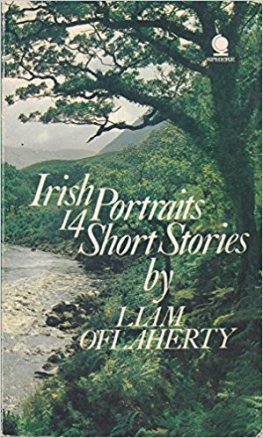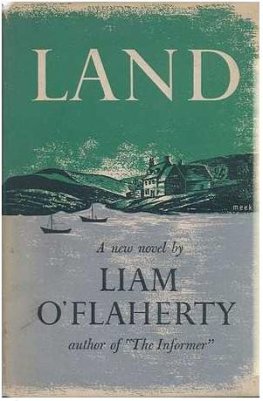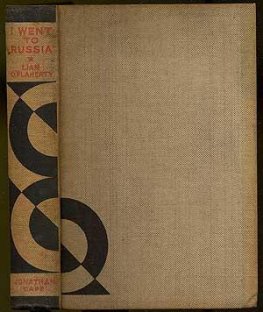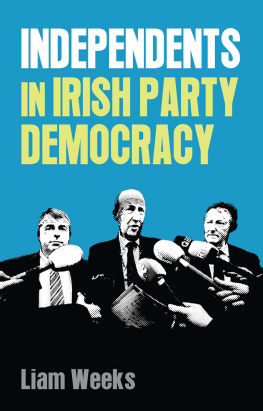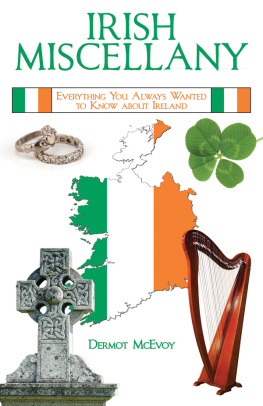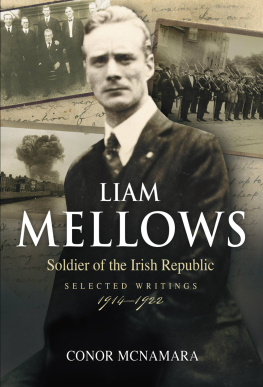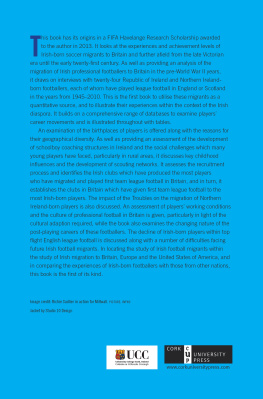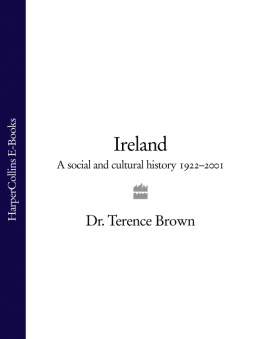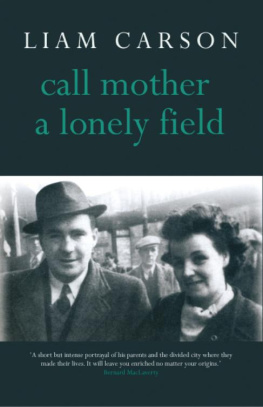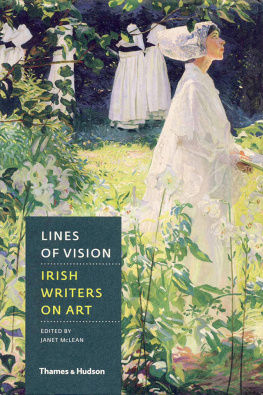Irish Portraits: 14 Short Stories by Liam OFlaherty
One lone star was following a little half-grown moon across an open space in the dark sky. All round, the firmament was full of sagging clouds. Some were black with hanging tails of rain that fell in far-off lands. Others were pale with the light of waning day. The stark earth was swept by a bitter wind. The dying light of the hidden sun lay brown upon its back, like the shroud upon a corpse.
Yet birds were singing in the wintry dusk. They smelt some tender current in the bitter air, telling them that spring was coming with sunlight and with flowers; as if a strange spirit passed upon the wind over the bleak rocks and the naked fields, whispering:
Soon. Soon now. Lambs are kicking in the womb.
Already people were preparing the ground for the sowing of their crops. Since an hour before dawn, Martin Bruty and his brother Patrick had been carrying seaweed on their mare to a field where they were going to plant potatoes. Now they were coming home, exhausted and drenched to the skin by the showers of hail that had fallen. Their hands were numb. Their sodden clothes were stained with the congealed slime of the weeds.
The mare walked quickly, with her neck stretched forward, shivering. Her hair was as smooth as a seals fur. She was straddled. A long piece of canvas stuffed with straw lay on her back from tail to mane, with a basket hung on either side from the two pegs in a wooden yoke. Wisps of straw from the straddles packing trailed under her belly.
Martin Bruty sat sideways on her haunches, reclining on the canvas as on a couch, his left forearm encircling the wooden yoke. He was forty years old, tall, lean, ungainly, with big muscular limbs and a beautiful face. His eyes were soft and wistful like those of a child. His countenance was pure, like that of a young virgin. His hair was grey at the temples. He looked at the sky, at the dim, stark land, at the horse and at passing birds with wonder and awe. Whenever a bird sang, he looked towards the spot whence the sweet sound came and his lips parted. He looked simple, kind, gentle, without care.
Patrick walked behind the mare, stepping very quickly in order to keep pace with her. He was five years older than his brother, yet he looked much younger. He was small and stout, with very short legs. He walked nervously, taking tiny steps and looking in all directions without noticing anything. He frowned and sniffed. There was a greedy look in his little blue eyes. His large white eyebrows moved up and down and he twitched his forehead when he sniffed. His cheeks were as red as beetroots. His cap was stuck at the back of his round skull, showing a bald patch over his forehead. He looked restless, unhappy, unpleasant, completely out of harmony with nature that was whispering of spring, young buds, sunshine and happiness.
He carried two pitchforks on his left shoulder. In his right hand he had a can of milk. They walked in silence. The canvas of the straddle creaked against its wooden yoke. The horses hoofs rang against the loose stones of the road. The wind whistled. The sea moaned in the distance. There were sounds of other horses, afar off, coming home and of people calling, in the village, at the top of the winding road that was bound by grey stone fences, ascending. The village was dimly visible at the summit of the hill, on the border of a wide barren crag. People were lighting their lamps and fowls were cackling as they waddled home from the pond.
Near the village, they overtook a woman who was walking with a little boy. She answered their salutation in a gay voice. They passed on. When they had rounded a corner, Patrick leaned against the fence and said to his brother:
Ill be up after you. Bring the horse to the field. Ill light the fire and have tea ready when you come back.
All right, said Martin, without looking at his brother.
He rode on. After a few yards, he suddenly sat erect, struck the horse in the flank with his foot and urged her on with an oath. She broke into a quick trot. His face darkened. He rode into the village at a gallop.
Huddled together, surrounded by stone fences, the houses were coloured like the savage wilderness about them, grey and bleak. In the dusk, their thatch and their whitewashed walls, drenched with rain that dripped from their eaves, looked as grey and desolate as the stones. The wind howled among them, sweeping across the naked crags from the cliffs beyond. To left and right, the rocky land rose in terraces to the black horizons. There was a smell of peat on the wind, acrid, making the scene still more melancholy.
Yet there was peace there and birds sang upon the gables of the houses, singing of golden, mellow summer dusks.
He rode the mare, through a gap in the fence, into the yard of a house in the centre of the village. The mare halted at the closed door of a barn on the left side of the yard. She shuddered and began to munch at wisps of straw that lay on the ground. Martin dismounted, opened the barn door, brought out a dish of raw potatoes and gave them to her. She whinnied and began to gobble them up, gripping them with difficulty between her soft, thick lips. He uncovered her. She spread out her four legs, shook herself and cleared her nostrils with a loud noise. Then he rubbed her from head to foot with a bunch of straw. Where the straddle had lain, her hide was hot and moist with perspiration. There was a big bay patch there. The rest of her hide was dark with rain. Everywhere he touched her hide, rubbing her, the hide trembled violently.
Now and again, while he worked, he glanced over his shoulder down the road. Each time his face darkened and he muttered an oath. Then again, as he turned to the mare, his face grew tender and he spoke to her as he rubbed her.
He bound up the straddle with a rope, hung the baskets on pegs in the barn wall, put the straddle into the barn, closed the door, mounted the mare and rode away. Now the mare snorted, straining at the halter, trying to break into a gallop. He brought her to a field among the hills, a mile from the house. It was pitch-dark when he returned.
There was a light in the house. Smoke rose from the chimney. Smoke also issued in gusts through the door, buffeted by a contrary wind. The house looked dreary. There were no curtains on the windows. The yard was wild, muddy, overgrown with weeds. The walls were almost black for want of whitewash.
When Martin entered, Patrick was on his knees on the hearth, blowing at a newly-made peat fire, over which a kettle was hanging from an iron hook. Little red flames ran to and fro among the sods of peat when he blew. When his breath died away, the flames vanished and a cloud of smoke arose from the fire. He did not look up when Martin entered.
This fire is enough to break the heart in a stone, he said. The rain must have come in on it in the barn. Strain the milk.
Isnt the kettle boiled yet, then? said Martin. Is it only now youre lighting the fire?
How could I have it lit? said Patrick angrily, without looking up. Im only just after coming in.
What kept you then?
I had business.
Blood anouns.
Martin strode to the dresser and seized the can of milk violently. His eyes were flashing.
You had business, he muttered. A fine business you had. The parish is talking about you.
Patrick went on blowing the fire.
Throw a little paraffin on that, said Martin, as he poured the milk through a cloth into another can.
No, said Patrick, jumping to his feet. Ill go out to the barn and chip a few slices of that plank we got from the wreck last year. Its no use wasting paraffin.
Martin looked after him angrily as he went out. He muttered to himself:
We could buy a lot of paraffin with all the money he spends on drink and chasing after every strip of a woman in the parish.

